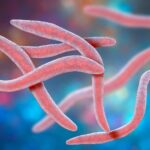What is already known
Maternal breast milk provides antibodies that protect the intestinal tract of infants against infection. Studies have also shown that antibodies from mothers vaccinated against a specific bacterium or virus can be transferred to babies through breast milk. However, how maternal antibodies contribute to the development of intestinal immune cells and the gut microbiota in infants is still poorly understood.
What this research adds
Working in mice, researchers assessed how immunoglobulin G (IgG) — a type of antibody that resides primarily in the blood — is transferred from a mother’s blood to her breast milk, and how IgG protects young mice from Citrobacter rodentium, the rodent equivalent of a pathogenic strain of Escherichia coli that causes severe intestinal infections. The team found that pups that received breast milk from mothers lacking IgG became sick after being infected with C. rodentium, while those that received breast milk with IgG antibodies did not. Mice that did not receive IgG from their mothers also developed abnormal gut microbiotas, which led to increased levels of immune cells that produce a molecule linked to inflammatory diseases. As adults, these mice were more susceptible to gut inflammation associated with inflammatory bowel disorder.
Conclusions
The findings suggest that IgG in breast milk promotes immunity against intestinal pathogens and shapes the development of the gut microbiota and immune cells in early life. They also highlight the benefits of breastfeeding.
Maternal breast milk is a key source of nutrients and immune molecules for infants. Researchers have now found that a specific type of antibody in breast milk helps establish healthy gut microbiotas in infant mice.
The findings, published in Science Immunology, suggest that specific antibodies in breast milk promote immunity against intestinal pathogens and shape the development of the gut microbiota and immune cells in early life. “Our findings really underscore the benefits of breastfeeding, both immediately and for the long-term development of the immune system in the offspring,” says senior study author Melody Zeng at Weill Cornell Medicine.
Scientists have known that antibodies from mothers vaccinated against a specific bacterium or virus can be transferred to babies through breast milk. However, how maternal antibodies contribute to the development of intestinal immune cells and the gut microbiota in infants is still poorly understood.
Previous studies have focuses on immunoglobulin A antibodies, which are common in breast milk. However, breast milk also contains immunoglobulin G (IgG) — a type of antibody that helps the body to fights infectious bacteria and viruses and is thought to reside primarily in the blood. So, Zeng and her colleagues sought to explore how IgG antibodies influence the gut microbiotas of newborn mice.
Gut protection
First, the researchers fed breast milk from mice lacking IgG and breast milk from normal mice to two separate groups of baby mice. Then, they infected the pups with Citrobacter rodentium, the rodent equivalent of a pathogenic strain of Escherichia coli that causes severe intestinal infections.
The team found that gut bacteria are able to induce IgG antibodies in the gut of mice, and the antibodies can be transferred from a mother’s blood to her breast milk. Pups that received breast milk from mothers lacking IgG became sick after being infected with C. rodentium, while those that received breast milk with IgG antibodies did not.
“This critical function of the gut microbiome-specific IgG might be leveraged in developing preventive or therapeutic strategies, such as maternal immunization or colonization with beneficial bacteria of interest, to strengthen neonatal immunity against enteric pathogens and facilitate proper development of the gut microbiome and immune cells in infants,” the authors say.
IgG immunization
Mice that did not receive IgG from their mothers also developed abnormal gut microbiotas, which led to increased levels of immune cells that produce a molecule linked to inflammatory diseases. As adults, these mice were more susceptible to gut inflammation associated with inflammatory bowel disorder.
Finally, the team set out to confer protection against gut infections by inducing IgG antibodies and then immunize female mice with them before the animals became pregnant. In pups that received breast milk with IgG, the antibodies stopped C. rodentium from attaching to the lining of the infants’ guts, thus helping to prevent infection.
“The same concept, in which vaccination enhances mothers’ IgG antibody levels and transfers this immunity to her babies, could protect human babies” Zeng says. “This strategy could especially benefit premature babies, since they tend to be at much higher risk from diarrheal diseases.”











